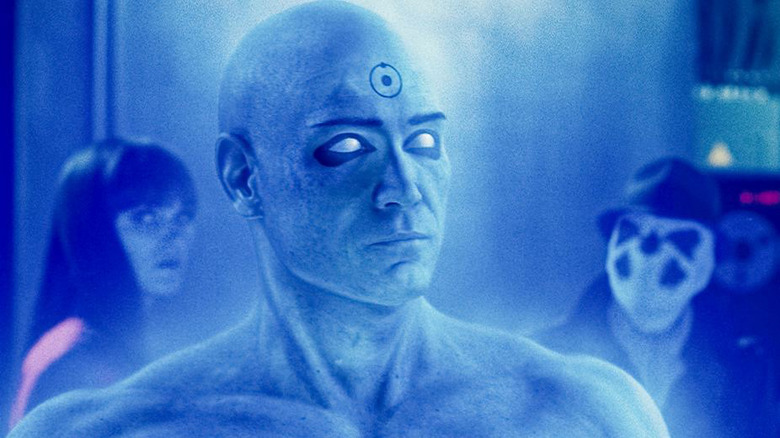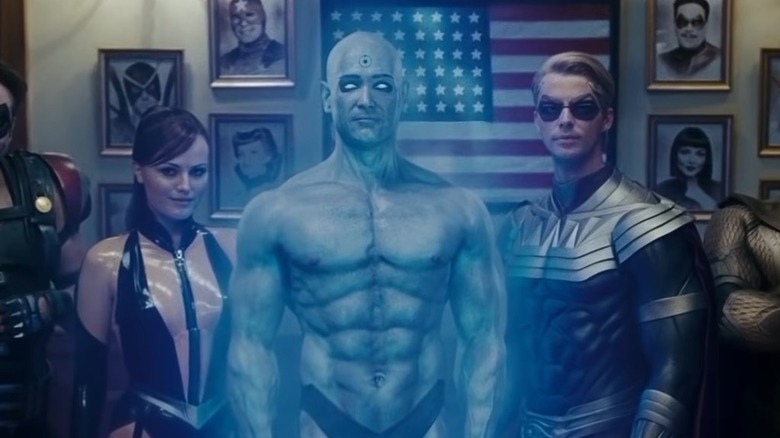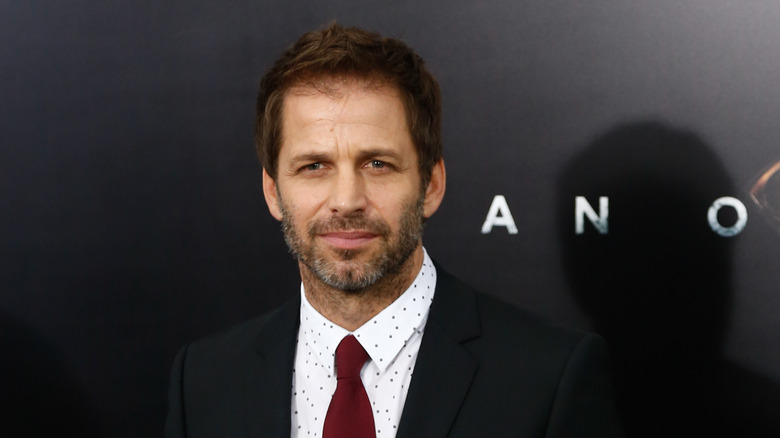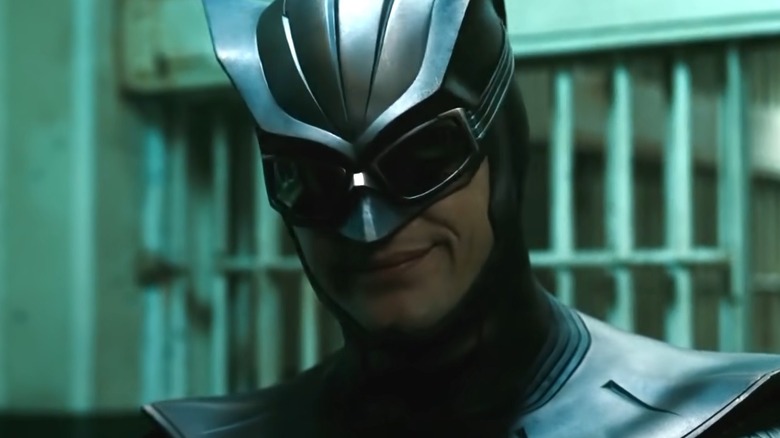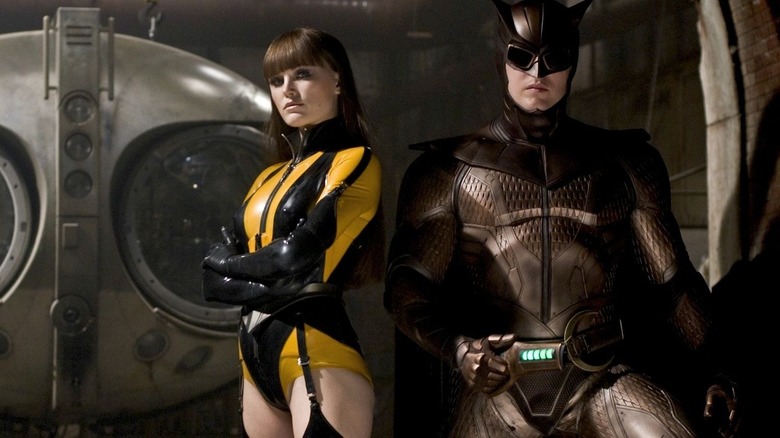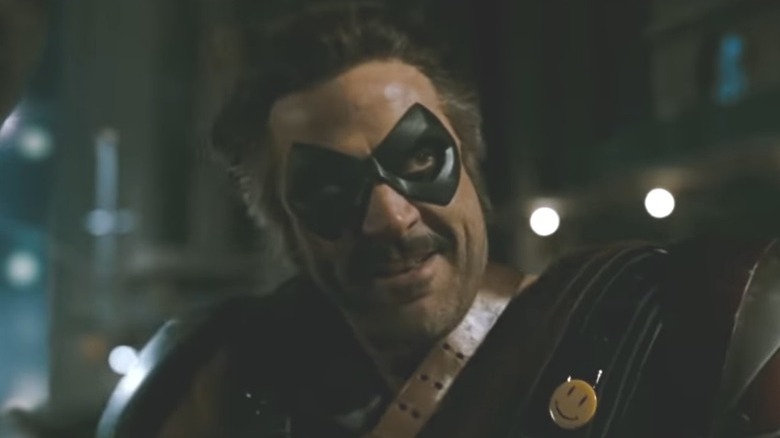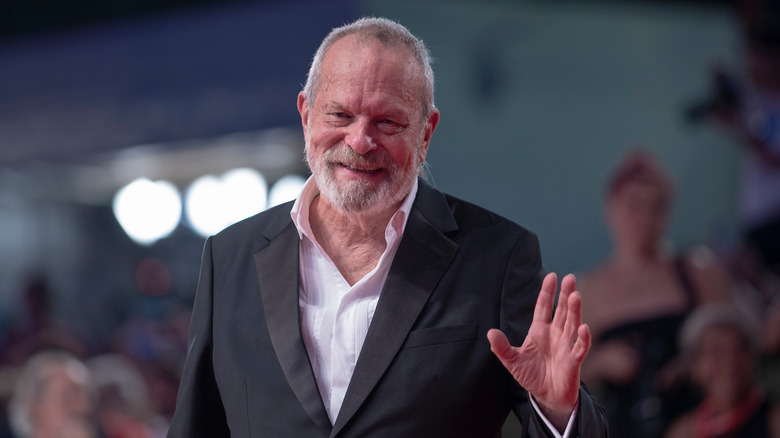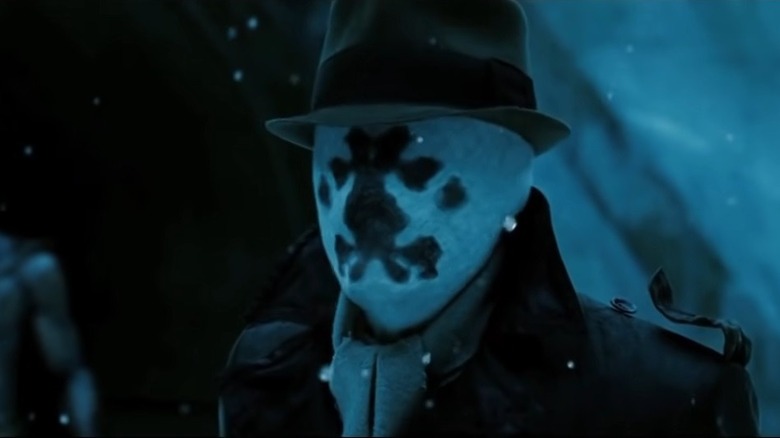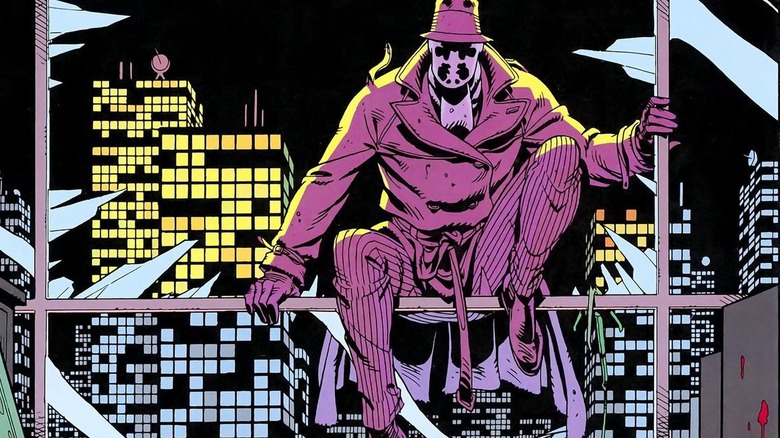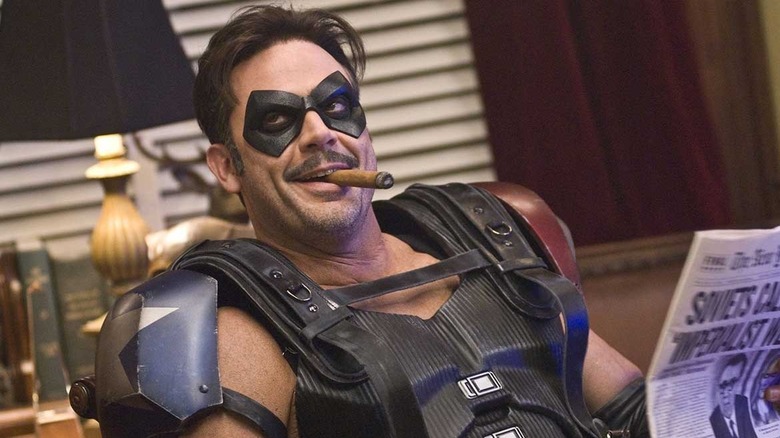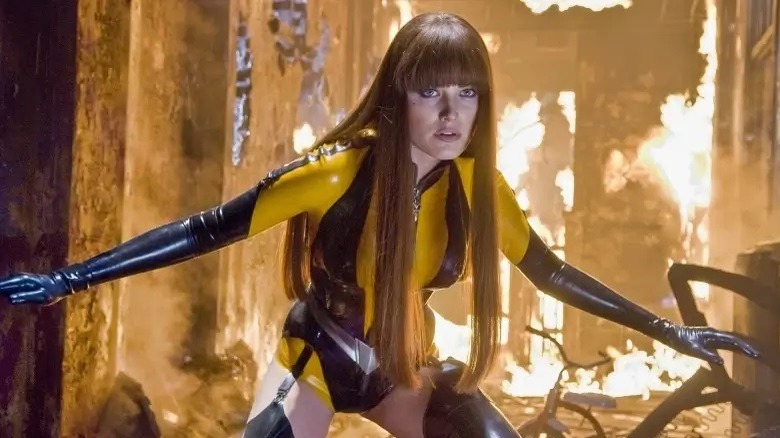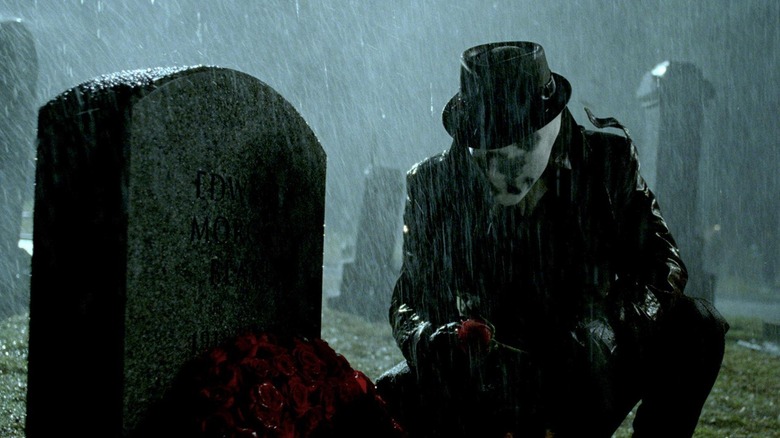The History Of Zack Snyder's Watchmen
Who watches the Watchmen? Well, judging by the 2009 film's box office performance, not enough people evidently. Zack Snyder's "Watchmen" cost $130 million to make and reaped in just over $185 million worldwide, as per Box Office Mojo. But don't let the paltry financial performance — by current comic book movie standards — fool anyone. It's a highly ambitious film that dared to be different in a climate when cape stories tended to be more of the same rather than boundary pushers. More importantly, it proved the unfilmable was filmable, since many critics wondered if the acclaimed comic book series from Alan Moore, Dave Gibbons, and John Higgins could ever translate well onto the big screen.
While "Watchmen" wasn't a universal hit with audiences or critics, it paved an important road for future comic book adaptations such as "The Boys" and "Invincible," which are deconstructions of the very concept of superheroes and how they fit into the world. At the same time, the journey of "Watchmen" to the screen was as tumultuous as the story it's based on. Read on to find out more about the surprising and shocking history of Zack Snyder's "Watchmen."
The Watchmen script Zack Snyder received was radically different
It's no secret that "Watchmen" is a different kind of comic book story. While it might have superheroes as its core focus, it is largely a satire of the cape genre, as Alan Moore revealed to GQ. It certainly isn't glamorizing or paying tribute to these characters; however, it appears this important point was lost on Hollywood, as the studio execs thought it was yet another superhero property they could use to peddle more toys and Happy Meals to the unsuspecting audience.
Having been a fan of the comic book series from a young age, Zack Snyder found issue with the first script he was handed for a potential "Watchmen" movie. "The studio was like, 'It's going to be PG-13, it's going to be updated [from 1985 and the Cold War] to the War on Terror, Dr. Manhattan goes to Iraq instead of Vietnam, no Manhattan on Mars, no Comedian's death, no Rorschach being interrogated — just a superhero movie. Just a real franchise-able superhero movie,'" Snyder told MTV.
The filmmaker admitted that he was aware how a property like "Watchmen" could go over the audience's head, especially with the deconstructionist nature of the genre. However, he also understood that commercializing and making it more franchise-friendly wasn't the solution either.
Considering an A-list cast for Zack Snyder's Watchmen
From Patrick Wilson to Carla Gugino, "Watchmen" features a wonderful cast of performers who bring these intricate characters to life. While their talent cannot be disputed, it's fair to say that no one was considered an A-list Hollywood actor when the film was released in 2009. This could have been much different, though, had the original plan to cast celebrities as the Watchmen panned out.
"It's funny because early on we talked about doing a bigger, more sort of 'Ocean's Eleven' style cast," Zack Snyder explained to The Guardian. "But the problem was that, as I was working on that concept, it was all about the irony of casting a movie like that, with big stars, so that the casting kind of commented on their roles."
Fortunately, Snyder identified that this idea was a double-edged sword and how the casting of celebrities might overshadow the entire point of the film, so he and the studio chose a different path. In the end, the actors chosen were able to shape the way the audience saw the characters on screen, rather than the viewers seeing the famous actors first and forming their own preconceived notions about who they were playing.
Nite Owl II's goggles were a serious problem
Many actors have complained about the trial and tribulations they endure to portray superheroes on screen. However, it isn't always about attaining the perfect six-pack or developing the types of arms that could be deemed weapons of mass seduction. Sometimes, the actual costumes are nonsensical nightmares since they're highly impractical to wear. Just ask Christian Bale, who suffered from a bout of claustrophobia when he put on Batman's cape and cowl for the first time, as he revealed to Access Hollywood.
While "Watchmen" is meant to be a parody of the superhero genre, its stars weren't immune from some of the costume pitfalls of comic book movies. Patrick Wilson described to MTV how Nite Owl II's goggles were a nightmare to work with on set. "That was actually a real problem in the fights," he said. "The first fight scene we did was [the jail scene], and they had made the [goggles] so sealed to my head — [because of] the suction." Wilson added how hot and uncomfortable he became with the goggles, since they would mist up and make the fight scenes extra difficult to perform or even see.
Malin Akerman felt out of her depth in Watchmen
Before starring as Laurie Jupiter, aka Silk Spectre II, in "Watchmen," Malin Akerman appeared in notable films such as "Harold and Kumar Go to White Castle," "The Heartbreak Kid," and "27 Dresses." She might not have been considered an A-lister at the time of her casting in Zack Snyder's film, but she was far from an unknown quantity in the industry either. That's why it's surprising to learn that Akerman experienced a serious case of the jitters as "Watchmen" marked her first foray into blockbuster territory.
Appearing on Collider Ladies Night, Akerman explained how she felt out of her depth on the production. "I really struggled because it was such a big film and I really felt like I had no idea what I was doing," she said. "I had no training and I was working with these fabulous theater actors who had all the training in the world. I definitely didn't feel worthy of being there. I felt like I had tricked them into casting me."
Akerman admitted she felt unprepared for the role in the first place, while everyone else seemingly knew what was required of them. She added how the experience served as a fork-in-the-road moment for her career, as she started to become more aware and discerning about the parts she'd choose moving forward.
The first cut of Watchmen was three hours long and a hard R
If Zack Snyder's films have taught us one thing, it's that he loves long cuts of his movies and straying outside of the confines of PG-13 — even if the theatrical editions are already pushing those boundaries and testing the patience of studio execs who want family-friendly blockbuster entertainment delivered in under two hours. The filmmaker is notorious for the lengthier and more graphic cuts of his movies — one only needs to ask the Snyder Cut fans who clamored for his untampered version of "Justice League" for years.
"Watchmen" wasn't immune to Snyderisms either. The theatrical cut clocked in at two hours and 42 minutes and was rated R, as per IMDb, though Snyder revealed to Entertainment Weekly that he did some trimming to get there. His original cut pushed three hours, with racier and far more violent content, but he ultimately had to grab the scissors and slice down the film for Warner Bros. He did credit the studio for getting behind his vision and trying to find some middle ground, while emphasizing that "Watchmen" wasn't a traditional comic book property. "You can't make it into something else, you really can't," he said. "It's not 'Fantastic Four,' it's got to be hard R, it's got to challenge everyone's ideas."
Zack Snyder said he saved Watchmen from Terry Gilliam
Zack Snyder is neither the first nor last person to adapt "Watchmen." Before he signed up to direct the film, there were various other filmmakers linked to the project. 20th Century Fox had acquired film rights for the graphic novel in 1986, as per The New York Times, with a few false starts to the journey — including one where "Monty Python" star and "Twelve Monkeys" director Terry Gilliam was attached to direct for the longest stretch of time.
Despite Snyder's "Watchmen" aging like a fine wine and being widely regarded as one of the best in the genre, there were many detractors when the film debuted. One of them was fabled Hollywood producer Joel Silver, who called the director a "slave" to the comics. Snyder snapped back at the criticism in an interview with HuffPost, stating: "I just love the movie and it was a labor of love. And I made it because I knew that the studio would have made the movie anyway and they would have made it crazy. So, finally I made it to save it from the Terry Gilliams of this world." He added that Gilliam's version of the film would have upset fans with its proposed deviations from the source material.
Rorschach impacted Jackie Earle Haley more than any role
From Freddy Krueger in the "A Nightmare on Elm Street" remake to Kelly Leak in the "Bad News Bears" films, Jackie Earle Haley has played more than his fair share of iconic characters throughout the years as his filmography continues to expand. Yet there's one role that cuts deeper than all others: the controversial Rorschach from "Watchmen." Haley explained to Esquire how Rorschach's uncompromising view of the world influenced him during the shoot, as he felt the character creep into his own psyche and force him to relook his own unconscious biases, especially in terms of politics.
"During the process of filming, the primaries were going on, you know — Hillary [Clinton] and Barack [Obama] — and I was isolated in my apartment in Vancouver, prepping and thinking and trying to look at the world through his prism," Haley said, "And he's definitely made me more cynical. And he's also forced me to look at my opinion of things."
Zack Snyder didn't speak to Alan Moore beforehand
Knock, knock. Who's there? Definitely not Alan Moore, since he isn't prepared to deal with the drudgeries of Hollywood. The writer famously hates every single adaptation of his work, refusing to watch or participate in the productions. In fact, Moore revealed in an interview with GQ how he told Damon Lindelof, the showrunner of the "Watchmen" TV series, to never contact him again after the latter reached out. At this point, everyone should know better than to bother Mr. Moore, who loves Tinseltown about as much as anyone would enjoy a poison ivy rash.
Not surprisingly, Moore wasn't glowing with praise about Zack Snyder's "Watchmen" either. The question is, did the director ever try to reach out to the legendary comic book writer? According to Snyder's comments to Entertainment Weekly, it was an emphatic "no." "That bridge had been burned before we got involved," he said. "Maybe it's a good thing — he probably would have talked me out of it. Alan's a genius, and his book is a genius."
Snyder added that his main hope was that the film would serve as a gateway for someone to pick up the comic book series. But even he acknowledged that there was no way his film could convey all the ideas presented in Moore, Dave Gibbons, and John Higgins' seminal, beloved story.
The studio sent Jeffrey Dean Morgan a Xeroxed copy of Watchmen
There's been a huge drive from people in the comic book industry to get Hollywood to push the source material of their adaptations. After all, comic book movies make billions of dollars and become money-printing machines, but the creators and books often receive a single line of gratitude in the film credits. So logic would dictate that the comics should become a bigger part of merch plans as well, right? Well, not all studios seem to view it this way.
In the case of "Watchmen," Warner Bros. couldn't even purchase a physical copy of the graphic novel for one of its stars. Speaking to Female.com.au, Jeffrey Dean Morgan admitted that he had heard of the series but hadn't read it before he received the call about the part of The Comedian. "My first time reading it was the day before I met with Zack [Snyder], and Warner Bros. sent me over a Xeroxed copy of the graphic novel, if you could believe it," he said, adding that it wasn't even in color.
It's kind of ironic to consider how studios included anti-piracy ads before their films — particularly the infamous "you wouldn't steal a car" spot — yet one of them effectively made photocopies of a book rather than purchase it. Pot, meet kettle.
The lawsuit that almost got Watchmen Batgirled
For many years, "Watchmen" was like the film equivalent of "Chinese Democracy," in the sense it felt like it would never get released. Then, like Guns N' Roses' storied and almost mythical album, it eventually did — but not without controversy and a full-blown lawsuit. In fact, the film was actually a few weeks' away from not being released at all, even though it had been filmed and wrapped production. The issue was a contractual rights dispute between Warner Bros. and Fox over who actually held the rights to the property.
As per The New York Times, Warner Bros. argued that producer Lawrence Gordon had signed over the "Watchmen" rights to the studio but failed to mention an agreement between a company he owned and Fox. Warner Bros. stated any fees or issues should be handled between Fox and Gordon, and not the rival studios. However, a judge ruled in Fox's favor. Fortunately, the studios were able to reach an undisclosed settlement agreement that allowed Warner Bros. to release Zack Snyder's "Watchmen" in theaters without delay, though they cut it very close with the court battle.
Zack Snyder thought Watchmen was ahead of its time
Hindsight is 20/20, but when it comes to comic book movies, knee-jerk reactions are part and parcel of the genre and the audience. Everyone is quick to formulate a definitive opinion on a film as soon as it drops, instead of letting the ideas percolate for a while. This is one of the reasons why there are so many retrospective pieces, years later, about these movies being harshly judged at the time of their release. Zack Snyder's "Watchmen" falls right in this category, as many critics and fans simply didn't know what to make of it upon release. It was a drastically different comic book movie than even the sophisticated likes of "Iron Man" or "The Dark Knight," with a mature undertone that the genre's then-audience might not have been ready for in 2009.
Snyder certainly believes this to be the case as well. The director argued to TheFilmJunkee (via The Direct) that "Watchmen" arrived about a decade too soon and that moviegoers weren't quite anticipating the deeper themes of the story. But Snyder also suggested that movie audiences have finally arrived at the same level as comic book readers, in the sense that they are now able to appreciate the message of "Watchmen" and what the film truly symbolized.
